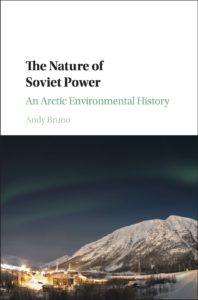The Nature of Soviet Power: An Arctic Environmental History came out with Cambridge University Press in 2016 as part of the Studies in Environment and History series.
During the twentieth century, the Soviet Union turned the Kola Peninsula in the northwest corner of the country into one of the most populated, industrialized, militarized, and polluted parts of the Arctic. This transformation suggests, above all, that environmental relations fundamentally shaped the Soviet experience. Interactions with the natural world both enabled industrial livelihoods and curtailed socialist promises. Nature itself was a participant in the communist project. Taking a long-term comparative perspective, The Nature of Soviet Power sees Soviet environmental history as part of the global pursuit for unending economic growth among modern states. This in-depth exploration of railroad construction, the mining and processing of phosphorus-rich apatite, reindeer herding, nickel and copper smelting, and energy production in the region examines Soviet cultural perceptions of nature, plans for development, lived experiences, and modifications to the physical world. While Soviet power remade nature, nature also remade Soviet power.
Reviews and Endorsements
“With this book, the small and growing field of Soviet environmental history has arrived. I write this because Bruno’s monograph is not only the chronicle of the industrial makeover of a northern periphery into the most populated, industrialized, militarized, and polluted part of the Arctic but a thoughtful exploration of the ideas and historiography that have powered environmental histories of the Soviet Union to date. In a respectful yet bold challenge, he takes on the underpinning assumptions of Soviet history, arguing that the Soviet industrialization of the Kola Peninsula in the most important ways was not terribly different from histories of industrial transformations in the capitalist world.”
Kate Brown (University of Maryland, Baltimore County) in The Journal of Modern History
“This is a very rich and mature study. The source base is wide, drawing on multiple archives and a broad swath of published materials. Information has been very well digested, too; Bruno fruitfully links his thoughts and conclusions to multiple historiographies and methodologies and considers details and broad pictures with equal agility. The Nature of Soviet Power will be of lasting importance to a wide range of readers interested in Russian, Soviet, and environmental history.”
Brain Bonhomme (Youngstown State University) in The American Historical Review
“This book is an exciting, meticulously researched, and path-breaking contribution to the environmental history of Russia and the Soviet Union. It demonstrates a prodigious amount of research, both in archival and in secondary literatures. Bruno is able to contextualize his own work within evolving discussions of environmental history in Russia and other regions. With a well-structured and readable narrative, while reading it myself I imagined how I would use it in the classroom.”
Jane Costlow (Bates College)
“The Nature of Soviet Power is an ambitious and thought-provoking book on an important topic, especially in light of the growing importance of polar regions in the era of climate change. The research presented is remarkably erudite, drawing upon an astonishing breadth of primary and secondary sources. It explicitly strives to reach new conclusions and probe for new explanations to account for the many environmental failures of Soviet industrialization of the far north. The book should make a strong contribution to the scholarly understanding of Soviet environmental history, and I laud the author for the tremendous effort that is visible on every page.”
Stephen Brain (Mississippi State University)
“Telling the dramatic story of the far-reaching transformation of the Kola Peninsula in the Russian far north, Bruno speaks to larger truths of environmental change in the USSR and the world in the twentieth century. Well-written and deeply researched, this is a must-read book for anyone interested in the relationship between state power and environmental change and a vivid example of the best new scholarship on Russian environmental history.”
Willard Sunderland (University of Cincinnati)
“Andy Bruno’s well-researched and convincing book argues that while the Soviet Union worked throughout its seventy-five-year tenure to develop its arctic lands into productive socialist spaces, powerful natural elements in these arctic landscapes were simultaneously at work shaping Soviet identity. Nature forced the state to modify and reassess its relationship with arctic landscapes.”
Jenny Leigh Smith (Hong Kong University of Science and Technology) in Environmental History
“The Nature of Soviet Power permet de réintégrer l’environnement dans l’histoire russe au 20e siècle, mais aussi, inversement, le phénomène soviétique dans le récit de l’avènement de l’anthropocène que sciences sociales et humaines ont entrepris de questionner depuis quelques années.”
Laurent Coumel (Centre d’études des mondes russe caucasien et centre-européen) in La Vie des Idées
“Andy Bruno’s work is an excellently researched and convincingly argued contribution to our knowledge of Stalinism and, equally important, to our understanding of the inner workings of the post-Stalinist period. In focusing on the apolitical, but nevertheless politically important actions of the natural world, Bruno forces us to acknowledge that forests, bogs, rivers and mountains were not only objects of human exploitation, but very much participating subjects that shaped the Soviet system. My strong recommendation of his work goes out to all scholars and students of the Soviet past.”
Lars Rowe (Fridtjof Nansen Institute) in The Soviet and Post-Soviet Review
Click here for the bibliography for The Nature of Soviet Power.
